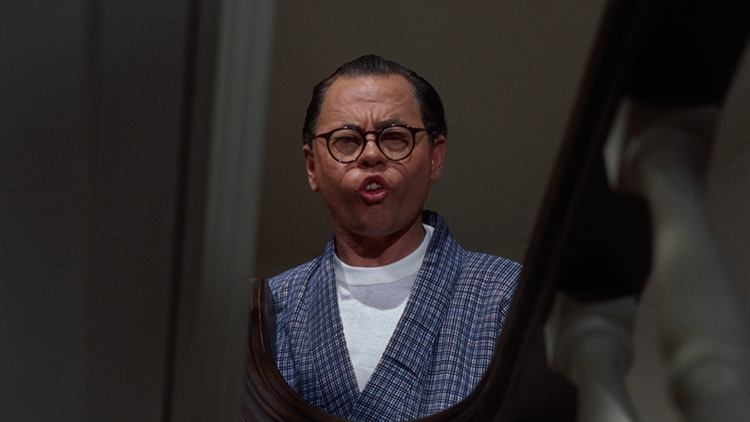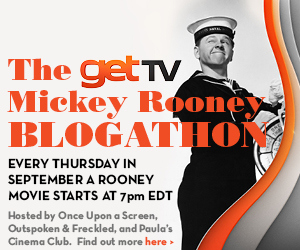This post is my contribution to the month-long getTV Mickey Rooney blogathon, hosted by a fabulous trio of bloggers: Once Upon a Screen, Outspoken and Freckled and Paula’s Cinema Club. See the full list of entries here, and don’t forget to visit the getTV schedule for details on Rooney screenings throughout the month.
When Mickey Rooney died in April this year, one film was notably absent from the obituaries that charted his colourful and varied life. Its omission wasn’t due to a lack of visibility – in fact, it’s quite the opposite – but the role in question remains one of Rooney’s most contentious. Despite all the highlights in the actor’s rich and varied career, one role cast (and continues to cast) a long shadow: his turn as Mr. Yunioshi in the Blake Edwards-directed, 1961 classic Breakfast at Tiffany’s. It might be the film that inspired a thousand Pinterest boards, seasonal fashion editorials and set a benchmark for a certain kind of romance, but there’s a darker side to the movie that is less regularly referenced.
Since the film’s release Rooney’s politically incorrect performance – complete with taped back eyelids, distinctive buckteeth and overly stereotypical accent – is often cited as one of the worst examples of Hollywood racism. The classic symbol of so-called ‘yellowface’ was no doubt inspired by the actor’s early vaudeville days but, thanks to the permanence of film, it’s a stereotype that is still talked about today. Cartoonish and borderline pervy, Mr. Yunioshi has seemingly no redeeming traits, and it’s impossible to ignore performance, so out of step is it with an otherwise commendable romantic comedy. Indeed, so deep does the opposition run that the role continues to generate protest and upset. In 2011, a Bronx resident launched a petition against Brooklyn Bridge Park’s decision to screen the movie – just one in a string of outcries surrounding Rooney’s role. Paramount, the studio behind Breakfast at Tiffany’s, acknowledged the depth of feeling and included a short documentary entitled Mr. Yunioshi: An Asian Perspective in the 50th anniversary DVD release.

Perhaps the actor just played as he was asked – Edwards was looking for a comic element, and Mr. Yunioshi provided it. On the one hand, the role can be seen as some lightweight slapstick, some easy humour, but in viewed through the lens of social progression, it’s undeniably racist. After spending more than forty years defending the role, Rooney finally admitted that he had some regrets, stating in a 2008 interview with the Sacramento Bee that: “I wouldn’t offend any person, be they black, Asian or whatever… It breaks my heart. Blake Edwards… wanted me to do it because he was a comedy director. They hired me to do this overboard, and we had fun doing it.” Previously, in a 45th anniversary edition of Tiffany’s, Edwards had also expressed remorse: “Looking back, I wish I had never done it… and I would give anything to be able to recast it, but it’s there”.

Rooney and Edwards probably didn’t set out to create contention, and a 1960s audience would surely have had a different reading – in fact, the New York Times review labelled Rooney’s role as ‘broadly exotic’. The movie is a product of its time, and the ‘Mr. Yunioshi’ character was probably already familiar to moviegoers as it harks back to WWII-era anti-Japanese propaganda cartoons. At least those characters were stereotyped with an aim, but 1960s (peacetime) Hollywood can claim no excuse other than ingrained racism. Tiffany’s isn’t the only example of ‘yellowface’ practice, but the film’s iconic status ensures that it’s one of the most discussed. It’s so much more than a ‘bit of fun’ because it’s roles such as this that perpetuated, validated and reinforced stereotypes that would take generations to dissipate. For a 1960s audience, conditioned to view Asians as villains, an enemy to be distrusted and overcome, the role might not have seemed a stretch, but it continued to foster an unrealistic characterisations of an entire race. It’s one thing to be under-represented or stereotyped, but to be deliberately misrepresented? That’s another question entirely and it’s the misrepresentation that makes the role particularly problematic. One suspects that an Asian actor playing the same slapstick role would’ve met with less criticism.

To Rooney and Edwards’ credit, they didn’t know they were making a film that would take a major role in classic Hollywood. If they had, they would undoubtedly have thought beyond the lazy characterisation and perhaps opted for a role that was closer to Truman Capote’s original, a creative artist with an eccentric edge. But of course, Breakfast at Tiffany’s was adopted into American culture and is a much-beloved global export, creating an entire global audience that’s meant to overlook (or at least put up with) ‘yellowface’. But is the act of watching condoning racism? Or is it about accepting that the film comes from another era and was made with an entirely set of ethical codes? In the short term, Rooney’s Mr. Yunioshi probably was a damaging stereotype that perpetuated WWII mythology, but in the long term it’s a reminder of how far Hollywood has come and how much still needs to be changed. Indeed, almost three decades later, Rooney’s character was used as an example of blatant anti-Asian racism in the 1991 film Dragon: The Bruce Lee Story, used to foreshadow the racism Lee himself would face in Hollywood. By no means is Rooney’s role one to be celebrated, but it should be remembered and learnt from and, perhaps for that reason alone, it remains one his most important.
Further reading: ‘A Certain Slant’: A brief history of Yellowface in Hollywood by Bright Lights Film Journal / The Mickey Rooney role nobody wants to talk too much about by WSJ / Asian images in film introduction by TCM


I really enjoyed reading your piece! Thank you for such an informative post! I was relieved to learn that both Rooney and Edwards later regretted their choices here, but it really makes you wonder what they were thinking in the first place, as by the 1960s most people were a bit more enlightened than this.
Not only is the characterization racist, but the whole over-the-top slapstick element really upsets the rhythm of the film.
Thanks again for your article!
Take care,
Janet
(Sister Celluloid)
Good blog! Sad to say, Jerry Lewis was still perpetrating his own version of this stereotype as late as 1981, with HARDLY WORKING.
Ahh yes, I forgot about the ‘special’ talents of Jerry Lewis. How he managed to get away with it I’ll never know!
Thanks for your comment Janet! I too was surprised that these attitudes still existed in the 60s, as I would’ve thought attitudes had moved on but I guess it was the early part of the decade and such ingrained attitudes don’t disappear overnight.
Great read, Vicki! I’m glad you did this, a topic worthy of attention. Terrible choice but it IS there as Edwards said. Thanks so much for contributing to the blogathon.
Aurora
As much as it’s not a role to celebrate it’s important not to ignore it as it says so much about attitudes and how much they’ve changed. It’s just a shame it’s a taint on what otherwise would be one of my favourite films.
Thanks for this post, Vicki. These scenes make me truly uncomfortable, as do quite a few others in classic movies in general.
Yes, it’s funny how once you start thinking about this type of lazy stereotyping you notice it in so many places!
Fascinating! I’m glad you chose the most dangerous of all of Rooney’s roles to discuss. I was embarrassed as I watched the movie, for myself and for Mickey. But, thinking here, I found another Asian comic sidekick in Blake Edwards’ career: Kato, Clouseau’s assistant, that is not so racist because he is played by an Asian actor, and not an American in yellowface.
About last post (Citizen Kane), I forgot to mention something in your crusade against Welles’ work: it is appointed as a plot hole the fact that Kane died alone… but still everybody knew that his very last world was Rosebud.
Thanks for the always kind comments!
Kisses!
I agree, Kato is very stereotyped and the character is riddled with cliches. I don’t think Edwards can be entirely excused by the era in which he was working, although his apology does seem a little to late.
And I couldn’t agree more with your comment about Kane – that plot hole is one of my BIGGEST annoyances with the film but it seemed like a bit of a shaky one to close the prosecution with 😉
Thank you for shining a light on this. I’ve never liked the movie for other reasons (She’s a child bride turned prostitute who tries not to fall in love with a gigolo. What’s to like besides a great dress and a pair of sunglasses?) and even read the short story to see if was any better. It wasn’t. But Mickey Rooney’s Mr. Yunioshi? So painful to watch even before I met my Japanese American husband. It breaks my heart to think that my children may see this movie one day. How do I even begin to explain this characterization to them, particularly when there were so few positive portrayals of Asians in popular media to offset it? (And the characterizations in the 1940s? Well, those didn’t do much good for American citizens of Japanese descent. They were sent to camps with armed guards because they were perceived as the enemy.)
I’m so glad you addressed this uncomfortable film role and the topic of racism and racial stereotypes in Hollywood. Jerry Lewis also played a part along with others in the asian stereotyping. I feel as uncomfortable with these portrayals as I do the ‘blackface’ scenes in classic films. But I don’t wish for these sections or roles to be removed. Like you, I agree that we mustn’t let this take away from our enjoyment of the other aspects of classic film. Rather we should highlight such examples as teaching moments, to be reminded of how far we’ve come and how much further we have yet to go. Thanks for joining our blogathon!
Tiffany’s is not a film I have ever been able to warm to. The appeal eludes me. It is interesting to read the perspectives time has given us on Rooney’s performance. Most likely the offense was based on a lack of thinking rather than a deliberate attempt to defame. Nonetheless, it is worth recognizing the harm.
Breakfast at Tiffany’s is not my fave film, although I admire every piece in Holly Golightly’s wardrobe. In my opinion, Mickey Rooney’s performance is the worst part of the film, for all the reasons you mentioned.
Well-written and thoughtful post. Too often Rooney’s character is glossed over when discussing this film.
Interesting commentary.
As embarrassing as that performance was/is, it really has to be viewed in the context of its era. The average moviegoer in those days probably didn’t give it much thought. Thank God we are past that.
It’s in the same vein that one can go back to old Westerns and see Native Americans played by whites in make- up (Like Rock Hudson, for example)
Yes, what were they thinking? WHAT? WERE? They THINKING?
Since my realm of interest is usually 1910s-20s films, I’ve seen more racial stereotypes than you could shake a forest full of sticks at. (When they pop up I tend to think “err, well, that’s certainly something of its time” and move on. It was the early 20th century, what else can I expect?) Rooney’s portrayal one of the most cartoony, over-the-top ones I’ve seen, especially for being that much later in the 20th century. Of course, Asian stereotypes in silent films tended to be more of the Broken Blossoms sort, not this Ill-Conceived Early Cereal Mascot that Rooney played.